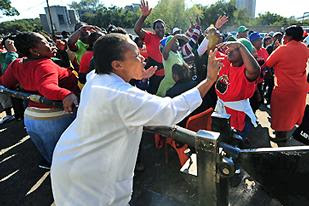
Strikes began last week and saw clashes between protesters
and police [AFP]
Source: Al Jazeera
http://english.aljazeera.net/news/africa/2010/08/20108265325707917.html
More than one million South African civil servants are gathering ahead of planned protests across the country over low wages.
Labor unions planned the action on Thursday as part of continued pressure on the government to agree to improved pay terms and benefits.
Around 1.3 million state workers have been on strike since Wednesday last week, picketing outside schools, hospitals and government offices.
A day after they began, the strikes became violent when police used rubber bullets and water cannons against teachers and other civil servants, who threw stones and bricks at them when trying to enter a hospital in Johannesburg.
The unions have set a deadline of September 2 for the government to provide a 8.6 per cent rise in salaries and a 1,000 rand ($138) monthly housing allowance, otherwise more state workers are slated to join the strikes.
The South African government is offering a seven per cent pay hike and 630 rand for housing.
Government services and the economy have already been disrupting by the strikes.
Patients affected
Doctors and activists warned on Wednesday that HIV and Aids patients are not receiving treatment because of the nationwide strike. An estimated 5.7 million people are living with HIV and Aids in South Africa, more than any other country.
One doctor, Ashraf Coovadia, said that his HIV/Aids clinic at a Johannesburg government hospital is receiving 20 to 30 patients whereas normally the figure would be 60 to 80.
He said that clinic staff have been calling patients to urge them to come in.
Patients typically receive three-month batches of drugs. They can develop drug resistance if they miss a few days of medication.
Coovadia said that people may fear encountering violence at state hospitals or think that they have been closed by the strikes.
He added that he has had to negotiate with strikers and security guards to ensure patients can enter the clinic safely.
"The situation is quite volatile," he said.
Under pressure
Maine de Clercq, from one of the striking unions the Public Workers Association, told Al Jazeera: "The government says they do not have the money and we are aware that it is above the inflation rate, but there is policy that we will always ask for inflation plus more.
"Other government officials have already been settled and received that.
"We have eight unions in the public service I represent one. We have not called for essential service workers to go on strike. We do not want people to die."
Al Jazeera's Haru Mutasa, in Johannesburg, said that strikers were planning to march to the education and health departments with a list of their demands on Thursday.
"That raises the stakes for President [Jacob] Zuma and his government. They are more under pressure now to come to some kind of an agreement with the workers and the workers have given the government one more week," Mutasa said.
"If there is no agreement and they do not get what they want they say that they will embark on an even bigger strike.
"They say that more people will join them and the aim then won't just be to bring the public sector to a halt but to bring the entire economy to a standstill."

















a.jpg)

a.jpg)








No comments:
Post a Comment
Thanks for commenting on this post. Please consider sharing it on Facebook or Twitter for a wider discussion.